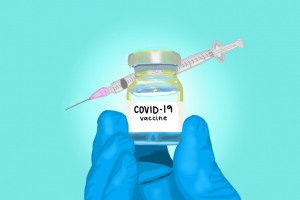COVID-19 vaccine incentives: ethical or unethical?
April 7, 2021
As COVID-19 vaccines are becoming available for more people across the U.S., a few businesses are giving out free things to those with proof of vaccination cards.
Krispy Kreme is giving out a free donut every day for the rest of the year, Chagrin Cinemas in Cleveland is giving out free popcorn through the end of April, Market Garden Brewery in Cleveland is offering 10-cent beers to the first 2021 adults who bring their card and a marijuana dispensary in Walled Lake, Michigan called The Greenhouse of Walled Lake is giving anyone over the age of 21 with proof of vaccination a free pre-rolled joint.
NBC said that when the 2021 NFL Draft is held in Cleveland in late April, selected vaccinated fans can view the action in the exclusive area the NFL calls the “inner circle.”
Besides businesses giving out free items and experiences, some popular employers are paying their workers to get vaccinated.
According to AARP, grocery stores, some of the first to implement COVID-19 safety measures, were also early leaders in offering to compensate hourly workers for the time it takes to get vaccinated.
Most employers are not providing vaccinations to employees. Instead, employees are signing up at outside places to get vaccinated.
The Aldi chain is offering its hourly employees up to four hours of pay; two for each dose of the vaccine. Amtrak is offering to pay workers the equivalent of two hours regular wages once they show a vaccination card.
Target is offering its hourly employees up to four hours of pay to compensate for the time they take off to be vaccinated and will reimburse up to $15 each way for its workers who take Lyft to their vaccination appointments.
Other employers such as McDonald’s, Trader Joe’s, Kroger, Lidl, Chobani and Dollar General are all doing similar measures to the ones described above.
Sophomore Autumn Banchik-Lesniak received a vaccine through her job at Winnebago Mental Health Institute in Oshkosh.
“Since I work with COVID patients, I think that that was my main [reason for getting the vaccine],” Banchik-Lesniak said. “If I didn’t work with COVID patients, I still would have gotten it.”
Banchik-Lesniak has met some family members outside wearing masks, but has not been able to go home for over a year due to some family members having weaker immune systems.
Senior Lecturer of the math department Mike Skowronski received his first vaccine dose last week through UWO. He said the process to get it was very easy.
“I was going to get [the vaccine] anyway,” Skowronski said. “Krispy Kreme is a nice deal, but that wouldn’t have made me run and get [a vaccine]. It’s a nice incentive.”
Skowronski’s wife has asthma and other immunity issues, so he got the vaccine to protect her and to get things back closer to “normal.” He and his wife also want to visit in-laws who live in Madison that they have not seen in over a year.
Skowronski is looking forward to the day where we do not have to wear masks, all businesses open back up, concerts start back up and Milwaukee can have full stadium capacity again.
While most people I have talked to on- and off-campus are getting the vaccine for their job or to keep them and their families safe, some people still remain hesitant to get the vaccine.
Vaccine hesitancy, according to The Lancet Child & Adolescent Health, is a “delay in acceptance or refusal of vaccines despite availability of vaccination services.”
This makes it harder to contain a disease. In order to have better disease control, populations have to reach herd immunity in which the majority of people cannot get sick or spread the disease to others.
Some people refuse to get the vaccine for health and/or religious reasons.
According to the Society for Human Resource Management, if an employer provides incentives for employees to get vaccinated as part of an employer’s wellness plan or program, incentives may cause a state of conflict with the Americans with Disabilities Act.
The Equal Employment Opportunity Commission proposed wellness plan regulations that would require an employer to provide only minimal incentives for employees to participate in a wellness plan.
Incentives should be minimal in order to not be coercive. Employers can continue to give paid time off to employees for as long as it takes them to go out and receive their doses, but any greater amount of money surpassing this starts to become questionable.
Businesses can continue giving out free incentives, and companies can continue paying employees to get vaccinated ethically, but it is still unknown whether it is ethical or not for employers to mandate employees to get vaccinated.
To look into the 1905 Jacobson v. Massachusetts case where the Supreme Court addressed mandatory vaccinations in regard to smallpox, which is similar to what we are facing with the COVID-19 pandemic, view: supreme.justia.com/cases/federal/us/197/11/.













